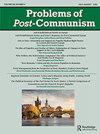中欧制宪会议:政府组建过程中的总统
IF 2
2区 社会学
Q2 POLITICAL SCIENCE
引用次数: 0
摘要
本文主要讨论捷克共和国、波兰和斯洛伐克有关组建政府的宪法惯例。本文运用非正式制度的概念,以盎格鲁-撒克逊学术为基础,辅以中欧文献,将立宪公约视为一种特殊类型的非正式制度。本文从政治学和宪法理论的角度出发,采用对宪法条款的形式分析和对实际政治宪法实践的分析,确定了自1990年以来在每个国家出现的两三个宪法公约。本文章由计算机程序翻译,如有差异,请以英文原文为准。
Constitutional Conventions in Central Europe: Presidents in Government Formation Process
ABSTRACT This article is focused on constitutional conventions pertaining to government formation in the Czech Republic, Poland, and Slovakia. Using the concept of informal institutions, building on Anglo-Saxon scholarship complemented with Central European literature, the article approaches constitutional conventions as a special type of informal institution. Taking perspectives of political science and constitutional theory, and employing both formal analysis of constitutional articles as well as analysis of actual political-constitutional practice, the article has identified two or three constitutional conventions that have emerged in each country since 1990.
求助全文
通过发布文献求助,成功后即可免费获取论文全文。
去求助
来源期刊

Problems of Post-Communism
POLITICAL SCIENCE-
CiteScore
4.00
自引率
12.50%
发文量
33
期刊介绍:
The post-communist countries are the most rapidly changing societies of Europe and Asia. For insight into this twenty-first century revolution, there is no better source than Problems of Post-Communism. Emphasis is placed on timely research covering current economic, political, security, and international developments and trends in Russia and China, Central Europe and Central Asia, Latin America, and Southeast Asia. Clarity and readability make the articles fully accessible to researchers, policy makers, and students alike.
 求助内容:
求助内容: 应助结果提醒方式:
应助结果提醒方式:


